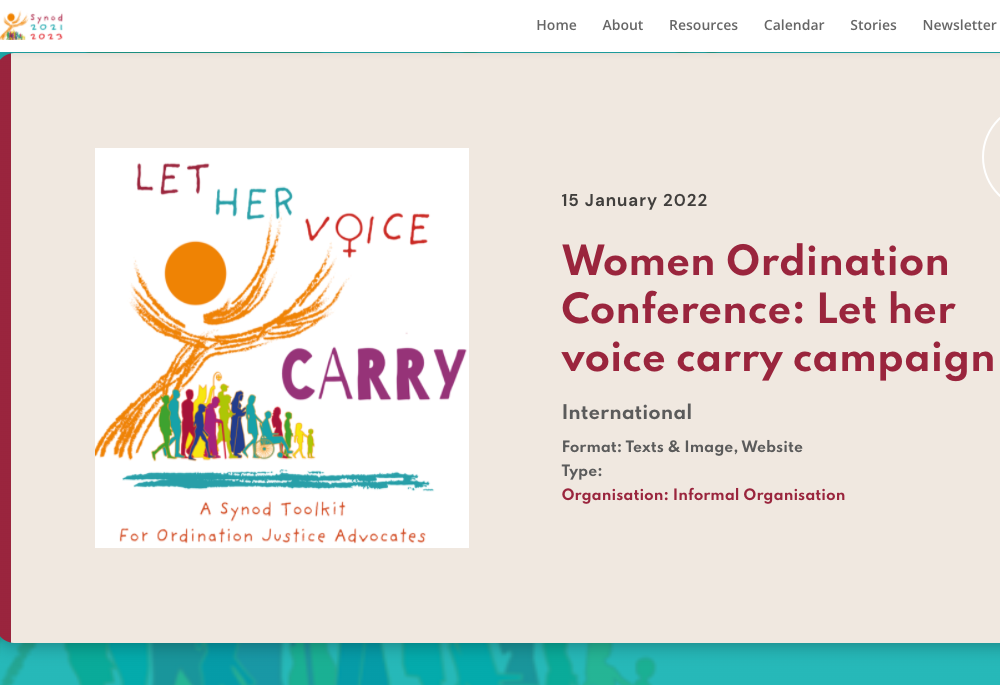
The Vatican has included Women's Ordination Conference on its website Synodrsources.org, with links to the organization's synod resources for the Catholic Church's ongoing synodal process. (NCR screenshot)
A hopeless believer in dialogue, I regularly send messages to the Vatican and bishops to inform them of what the Women's Ordination Conference is up to. These messages are almost always met with silence, prayers for my confused soul, or worse, mansplaining a woman's place in the church.
So it was quite a surprise when the Vatican's synod office replied to my request to post Women's Ordination Conference synod resources on their website with a very normal confirmation that our effort, "Let Her Voice Carry," was added to their site. I believe it showed courage and openness, and some garden-variety decency women don't often get shown in the Catholic Church.
That's why it was such a surprise to me when NCR columnist Michael Sean Winters took a swipe at the Women's Ordination Conference and New Ways Ministry in his column, inferring we might impose American "activist" agendas onto the synodal process. He urged us, and all synod participants, to be "docile" and "receptive" — where have we heard that before? — and to "make room for the Spirit." His suggestions were not dissimilar to those in the EWTN-owned National Catholic Register that criticized WOC as "inconsistent with an authentic Catholic spirit," for our lack of respect for the role of the bishops in synodality. Both pieces had a similar undertone: know your place.
So much for decency.
We at the Women's Ordination Conference read the synod preparatory documents and felt incredible hope. We highlighted various sections, passed quotes back and forth with our eyes wide, and concluded: This is a once in a lifetime moment.
We quickly created resources, established listening sessions and prepared talking points, as we knew many of our own members would be skeptical. I wrote to the Vatican with WOC's resources and said: "We believe in the inclusive promise of the synodal process, and are actively encouraging our members to engage locally in their parishes, or through small groups on their own. We are enthusiastic about working together to expand and enliven the synodal process for women."
This is hard work and a hard sell for many women's ordination advocates who have a well-earned distrust of Vatican charades. An institution that fails to practice gender equity, that criminalizes women's ordination, and has attempted to silence and discredit women for centuries has lost much of its credibility when it comes to "inclusion."
Advertisement
Yet, the integrity and impact of the synod will depend on the radical inclusion and welcome of often marginalized voices into courageous conversations. The Vademecum, or official handbook, states, "Genuine efforts must be made to ensure the inclusion of those at the margins or who feel excluded."
It goes on: "We must make a special effort to listen to those we may be tempted to see as unimportant and those who force us to consider new points of view that may change our way of thinking."
I believe we are doing that work. The hope that those voices are heard is not a subversive or American agenda, but a deep prayer for the church that comes from an acute awareness that clericalism could sabotage the entire process. Our agenda is to live out the demands of the Gospel.
What isn't hard work for women's ordination advocates is synodality. We call it shared leadership, consensus-building, feminist ministry, co-responsibility, renewed priesthood, being church. So while the U.S. bishops may struggle to wrap their heads around showing up and listening, we are uniquely prepared for this moment.
I ask simply that we are granted the respect of encounter before we are dismissed. I suspect our naysayers assume our listening sessions are little women's ordination rallies, but if they attended one of our listening sessions, they might find themselves engaged in an Examen, or in a small group reflecting on questions like: "What am I hearing the Holy Spirit saying to us?" or "Where is God calling the church as it journeys together?"
People attend our sessions because they do not feel welcomed or safe in their parishes, or more likely, their bishop has failed to put any meaningful process in place for the synod and they want to participate in some way. One of our community agreements is in fact to "Leave room for the Holy Spirit!" But unlike many within the U.S. bishops' conference and the Vatican, we are not afraid of what the Holy Spirit might have to say.
Of course, there is nothing wrong with a little women's ordination rally, nor are we ashamed of having a mission, a vision and values we uphold as we work for justice. Certainly we will continue our lobby for greater representation and decision-making for women within the synod itself, which the synod office has cautiously embraced after many years of resistance.
But far from a narrowly conceived "project" or political ploy, our call for equality is informed by Jesus' radical inclusion of and friendships with women. Our steadfast advocacy for the ordination of women as deacons, priests and bishops continues as we endeavor to co-create the kin-dom of God.
So while some may want to believe that women's ordination advocates are lost in the wilderness, we are very much on the journey, and if you ask me, leading the way.







